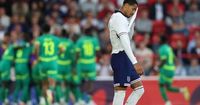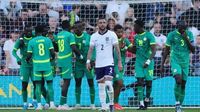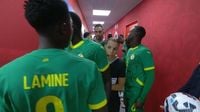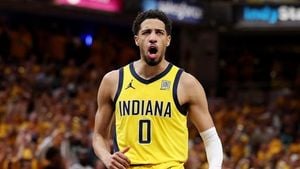England's preparations for the 2026 World Cup faced a significant setback as they suffered their first defeat under head coach Thomas Tuchel, losing 3-1 to Senegal in a friendly at Nottingham Forest's City Ground on June 10, 2025. This defeat marked a historic moment, as Senegal became the first African team to beat England's men's side, halting England's unbeaten run against African opposition that stretched back to 21 matches with 15 wins and six draws.
The match, which kicked off slightly late at 7:50 PM due to Senegal's delayed exit from the dressing room, started promisingly for England. Within seven minutes, captain Harry Kane scored his 73rd international goal, tapping in a rebound after Senegal goalkeeper Edouard Mendy failed to hold a shot from Anthony Gordon. This early lead suggested England might continue their strong form, having won their previous three matches under Tuchel and maintained a perfect record on the road in World Cup qualifying.
However, the initial optimism faded as Senegal steadily imposed themselves on the game. The visitors drew level five minutes before halftime when Ismaila Sarr capitalized on a rare defensive lapse by England's right-back Kyle Walker, who was caught off guard at the far post. Walker, 35 years old and making his 96th England appearance, was widely rated poorly for his performance, with critics noting his age showed against the quicker Senegal side. The equalizer was the first goal England had conceded under Tuchel in four games, exposing vulnerabilities in the backline that Senegal would exploit further.
After the break, Senegal took the lead just after the hour mark through Habib Diarra, who cleverly found space behind England's defense and fired a shot through goalkeeper Dean Henderson's legs. Henderson, deputizing for the usual starter Jordan Pickford, had kept England in the game during the first half with several saves but was ultimately beaten by Senegal's incisiveness. The second goal highlighted England's defensive frailties, with a combination of poor positioning and a lack of coordination among defenders Levi Colwill, Myles Lewis-Skelly, and Trevoh Chalobah, who was making his England debut and showed promise despite the team's struggles.
England pushed for an equalizer in the final stages, with substitute Jude Bellingham finding the net late on. However, the goal was controversially ruled out by the video assistant referee (VAR) due to a handball by Levi Colwill, a decision that sparked frustration among players and fans alike. VAR's involvement in a friendly match raised eyebrows, especially considering the contentious nature of the call.
The visitors sealed their victory in stoppage time when substitute Curtis Jones lost possession, allowing Cheikh Sabaly to finish calmly and make the scoreline 3-1. The defeat was met with boos from the home crowd, reflecting the disappointment of a night where England were comprehensively outplayed by a vibrant and physically dominant Senegal team.
Thomas Tuchel, visibly frustrated on the touchline, reflected on the team's performance in his post-match comments. He lamented, "We were stuck in possession, not moving enough, not brave enough to find the pass in the gap, not free enough to control the ball under pressure. Our possession was mainly in our own half. We had two big chances to go 2-0 up and didn't take them. It's our responsibility for losing the match with two very, very cheap goals we conceded... It is a tough lesson. We hate to lose but we need to see the players under these conditions. (They need) to be smarter." Tuchel also explained his tactical decisions, including the late introduction of Ivan Toney, emphasizing the need for players who can operate effectively in and around the box.
Despite the setback, Tuchel urged calm, noting, "We lost a test match, there is no need to panic. We have played three competitive matches, nine points and no goals conceded. We know more now, we are smarter. I am the first to dislike losses like nothing else but it's not next week we go to the World Cup." Captain Harry Kane echoed this sentiment, stating, "We're not going to panic but we know that we need to do better. There are some ideas that are new to the players and we have some new players coming into the team. It's a mixture of things but there are no excuses. We need to find it quick, we're not going to meet again for another couple of months. The World Cup's going to come around really fast so every camp is really important right now." Kane also made history by becoming the first England player to score in each of a manager’s first four matches in charge, underlining his importance to the squad.
Senegal manager Pape Thiaw praised his team's performance and mindset, saying, "I would like to congratulate my players who have won this match for their tremendous performance and mindset. Also congratulations to the England team who played a good match. We felt we were on top but then they scored a goal. We came back, showed a great mentality, in the second half we were able to impose our game a bit more. Well done to the players, well done to the federation for enabling us to play this kind of match." Thiaw also highlighted the integration of younger players into the squad and the positive atmosphere within the team.
From a tactical and personnel perspective, the match raised questions about England's defensive options, particularly at right-back. Kyle Walker’s performance was widely criticized, with many suggesting that younger alternatives like Trent Alexander-Arnold or Reece James should be favored if England are to mount a serious World Cup challenge. Meanwhile, debutant Trevoh Chalobah was one of the few bright spots, showing composure and potential despite the collective defensive issues.
The match also spotlighted England's attacking struggles beyond Kane. Players like Bukayo Saka and Conor Gallagher had difficulty breaking down Senegal's organized defense. Anthony Gordon, who assisted Kane’s goal, was noted for a missed opportunity when he failed to convert a simple chance that could have doubled England's lead. The substitutions, including Morgan Gibbs-White and Jude Bellingham, injected some energy but were unable to change the course of the game.
Looking ahead, England's next fixtures are scheduled for September 2025, with World Cup qualifiers against Andorra at Villa Park on September 6, followed by a trip to Serbia three days later. These matches will be critical for Tuchel to assess his squad and make necessary adjustments before the World Cup in Canada, the United States, and Mexico next summer.
In the meantime, Tuchel and his staff face the challenge of addressing the defensive lapses and improving the team's attacking fluidity. The friendly defeat to Senegal serves as a stark reminder that despite the promising start to Tuchel’s tenure, significant work remains to build a team capable of competing for international honors.
As the World Cup approaches, England's players and coaching staff will need to reflect on the lessons from this historic loss and strive to develop the cohesion, resilience, and tactical sharpness required to succeed on football's biggest stage.






